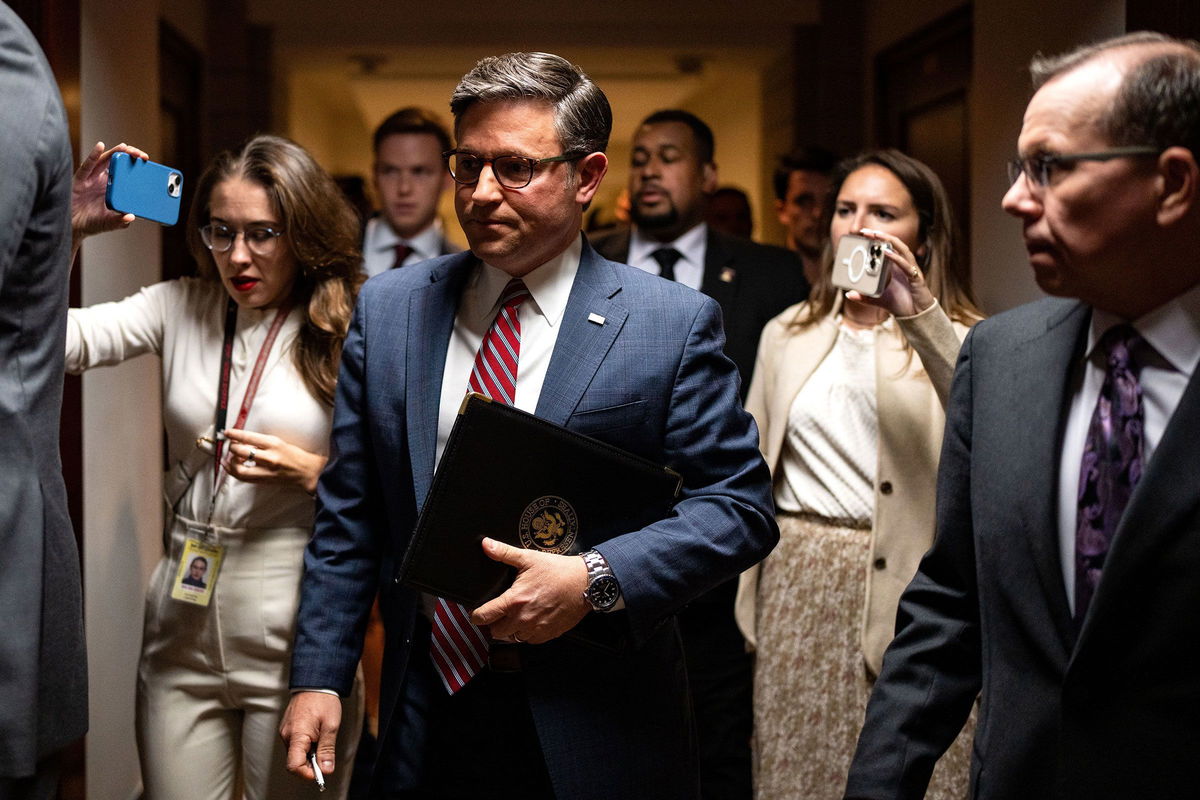Speaker Johnson navigates Trump and a narrow majority in government funding fight

House Speaker Mike Johnson speaks with reporters as he departs a news conference at the US Capitol in Washington
Washington (CNN) — Speaker Mike Johnson is once again facing a major challenge as he navigates a government funding fight while under pressure from an extremely narrow majority in the House and former President Donald Trump.
Congress is up against a shutdown deadline at the end of the month, but so far there is no clear consensus on a path forward. Adding to the urgency is the fact that vulnerable lawmakers hope to hit the campaign trail for the final stretch ahead of the November elections as soon as possible, and the threat that a shutdown could lead to fallout at the ballot box. The course the speaker charts could also factor into whether he can hold onto his leadership post after the election.
Trump has also waded into the funding fight, a dynamic that could further complicate the effort to avert a shutdown. The GOP presidential nominee has said that if Republicans don’t receive “absolute assurances” on election security, they should not pass a funding extension. The move comes as Trump continues to sow doubts over election integrity in the run-up to the 2024 elections.
If Trump digs in on his demand, that could make it even harder for Congress to ultimately pass a “clean” funding extension, which is widely viewed on Capitol Hill as the only viable way to avert a shutdown.
Johnson, a Louisiana Republican, has been pushing a six-month funding plan that includes the SAVE Act, a controversial GOP-led bill that would require documentary proof of US citizenship to register to vote in federal elections. But the plan is viewed as a non-starter in the Senate and faces opposition within the House GOP conference as well.
The speaker has emphasized agreement with Trump, but he has limited options and little margin of error with such a narrow majority in the House and with Democrats in control of the Senate.
Johnson pulled a vote on the GOP funding plan last week after at least eight Republicans had publicly come out against it, enough to sink the bill in the House along with Democratic opposition.
“Congress has a lot of responsibilities, but two primary obligations: responsibly fund the government and make sure that our elections are free and fair and secure, and that’s what we’re working on,” Johnson told reporters as he announced the vote would be pulled. “We’re going to continue to work on this. The whip is going to do the hard work and build consensus. We’re going to work through the weekend on that.”
Senate Majority Leader Chuck Schumer, a Democrat from New York, said last week that Johnson is “not getting anywhere” by trying to pass a funding package without Democratic support.
“We need a bipartisan bill where everyone comes together and figures out what to do,” Schumer said. “You’ve seen the chaos in the House because Speaker Johnson is trying to do this in a partisan way, guided by the far right. He’s not getting anywhere.”
Sen. Susan Collins of Maine, the top Republican on the Senate Appropriations Committee, warned on Monday that the GOP proposal of a six-month funding extension – known as a continuing resolution, or CR – would be “catastrophic.”
“I do strongly believe that we should not go to March for the CR. That would have catastrophic consequences for our national defense and create difficulties for every agency and department,” she told reporters.
“In addition, I believe that the new administration, regardless of who wins, should have a clean slate, not having to deal with issues that date back to October 1.”
Collins warned that Congress is running out of time to avoid a shutdown. “I am very worried. I don’t think that anybody wants a shutdown, but we could slide into a shutdown if we don’t get the work done,” she said.
As the November elections dominate the political landscape, however, bipartisanship may be even more difficult to achieve.
Schumer has announced that that the Senate will once again vote on an IVF bill, after the same bill failed to advance in June amid widespread GOP opposition and after Trump said in August that he will implement a policy as president that would pay for in vitro fertilization treatments, without specifying how the treatments would be paid for.
“Republicans can’t claim to be pro-family, only to block protections for IVF,” Schumer said. “The American people deserve another chance to see if Republicans are for access to IVF or against it.”
This story has been updated with additional developments.
CNN’s Ted Barrett, Lauren Fox and Aaron Pellish contributed to this report.
The-CNN-Wire
™ & © 2024 Cable News Network, Inc., a Warner Bros. Discovery Company. All rights reserved.